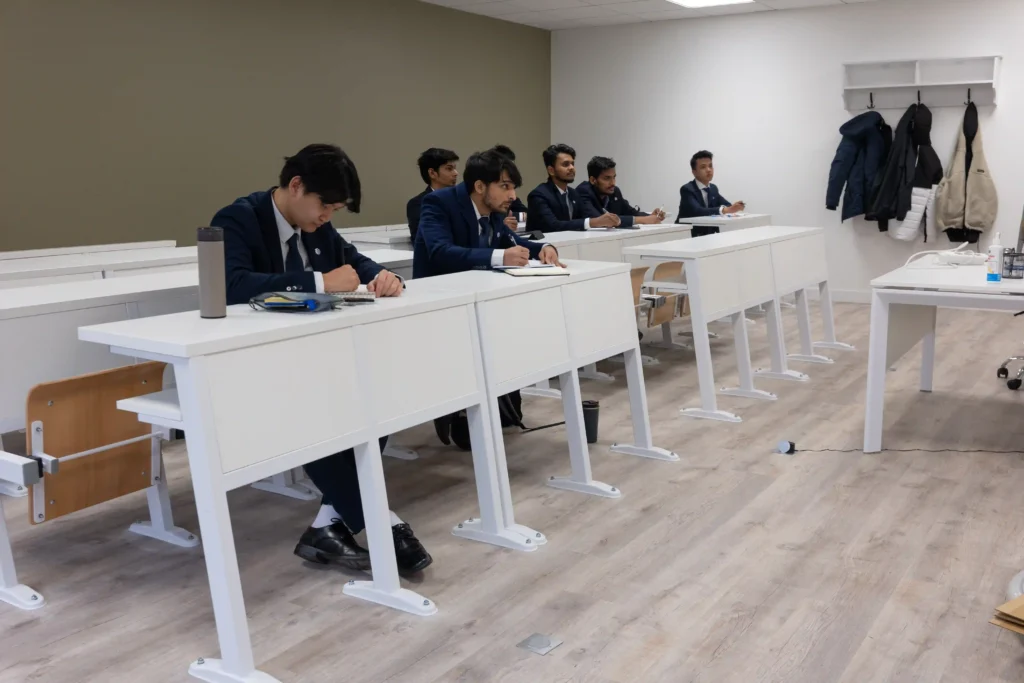Artificial intelligence is at the forefront of technological innovation, and Paris serves as a thriving hub for those looking to embark on a career in this field.
To start a career in artificial intelligence in Paris, individuals should focus on gaining solid foundational knowledge in data science, programming, and machine learning, paired with practical experience. The city is home to numerous prestigious universities and institutes offering specialised courses that can equip aspiring professionals with the necessary skills.
Networking is equally crucial in this competitive landscape. Engaging with industry professionals through meetups, workshops, and conferences can open doors to opportunities and collaborations.
Moreover, Paris boasts various tech start-ups and established firms that actively seek talent in AI, making it essential to stay informed about job openings and internships that align with one’s interests.
In addition to technical skills, staying updated on the latest trends and advancements in artificial intelligence will benefit those keen on building a successful career. By combining education, networking, and continuous learning, individuals can position themselves effectively within the dynamic AI scene in Paris.
Understanding Artificial Intelligence
Artificial Intelligence (AI) encompasses a range of technologies and concepts that simulate human intelligence in machines. This section explores AI’s evolution, key concepts, and its current market presence, providing important insights for those looking to enter this field.
The Evolution of AI
AI has a rich history that began in the mid-20th century. Initial developments were rooted in logical reasoning and rule-based systems.
The 1980s saw a shift towards neural networks, which mimicked human brain functions, allowing machines to learn from data.
Recent advancements include deep learning and natural language processing, enabling significant breakthroughs in image recognition and language understanding. This evolution has positioned AI as a critical component across various industries.
Key AI Concepts
Three key concepts define the AI landscape: machine learning, neural networks, and natural language processing.
Machine Learning: This subset of AI focuses on algorithms that enable systems to learn from data without explicit programming. Techniques such as supervised and unsupervised learning are commonly used.
Neural Networks: Inspired by the human brain, these models consist of interconnected nodes that process information. Deep learning, a type of neural network, involves multiple layers and has proven effective in complex tasks.
Natural Language Processing (NLP): NLP techniques help machines understand and generate human language. Applications include chatbots, translation services, and sentiment analysis.
AI in the Current Market
AI’s integration into various sectors is reshaping industries and creating new opportunities.
In finance, AI algorithms analyse vast datasets to detect fraud and optimise investments. The healthcare sector uses AI for diagnostics and personalised treatment plans, improving patient outcomes.
Additionally, AI is driving innovation in transportation through autonomous vehicles. Companies are increasingly investing in AI research, making it a crucial area for job seekers.
Understanding these market applications is vital for anyone looking to build a career in AI.
Educational Pathways in AI to Paris
Navigating the educational landscape for a career in artificial intelligence involves multiple routes. Key options include university degrees, online platforms, and specialised certification programmes, each offering unique benefits and opportunities.
University Degrees and Courses
Pursuing a degree in computer science, data science, or artificial intelligence is one of the most traditional pathways. Many universities in Paris, such as Sorbonne University and Télécom Paris, offer specialised programmes focusing on AI.
These degree courses typically cover essential topics like machine learning, neural networks, and data analysis.
Students may also engage in hands-on projects and internships, which can provide invaluable experience.
Earning a bachelor’s degree can lead to entry-level positions, while a master’s or PhD can lead to advanced roles in research and innovation.
Online Learning Platforms
Online learning platforms, such as Coursera and edX, provide flexible options for those seeking to enter the AI field. These platforms offer courses from reputable institutions, including introductory and advanced AI topics.
Participants can learn at their own pace and select courses tailored to their interests.
For example, courses in Python programming, deep learning, and natural language processing are highly beneficial.
Completing these courses often results in valuable credentials that can enhance a CV and demonstrate commitment to continuous learning.
Also Read: MBA Artificial Intelligence in Paris: Your Path to Success
Specialisation and Certification Programmes
Specialisation programmes and professional certifications can deepen expertise in specific areas of AI. Institutions like DataCamp and the IBM AI Engineering Professional Certificate offer targeted training in niches such as AI ethics, machine learning deployment, and more.
These certifications provide practical skills along with theoretical knowledge.
They cater to both beginners and experienced professionals aiming for career advancement.
Moreover, obtaining recognised certifications can improve job prospects and distinguish candidates in a competitive job market.
Gaining Practical Experience
Practical experience is essential for anyone starting a career in artificial intelligence. Engaging in internships, participating in open-source projects, and competing in hackathons are excellent ways to gain relevant skills and enhance one’s CV.
Internships in Paris
Internships provide valuable real-world experience and networking opportunities. Many companies in Paris, such as Dassault Systèmes, Thales, and numerous startups, offer AI-focused internships.
Candidates should seek roles that involve machine learning, data analysis, or AI development. Internships typically last from three to six months, allowing individuals to contribute to ongoing projects while learning from experienced professionals.
It is essential to tailor applications with specific skills, such as proficiency in Python, R, or TensorFlow. Networking at AI meetups and conferences can also assist in uncovering internship opportunities.
Open-Source Projects
Contributing to open-source projects is an effective way to develop skills and showcase abilities. Platforms like GitHub host numerous AI projects that welcome contributions.
Individuals can start by identifying projects that align with their interests, whether it’s natural language processing or computer vision. Engaging with the community by submitting code, fixing bugs, or writing documentation can enhance knowledge and visibility.
Many companies value open-source contributions as indicators of passion and skill. It also provides a platform for collaboration and mentorship within the AI community, which can lead to further career opportunities.
Hackathons and Competitions
Participating in hackathons and competitions is a dynamic way to apply knowledge in a competitive setting. Events like the Data Open and the AI Challenge attract talent from around the globe, offering prizes and potential recruitment opportunities.
These events typically involve solving real-world problems within a limited timeframe. Teams need to brainstorm, develop, and present solutions, which builds teamwork and problem-solving skills.
Involvement in multiple hackathons develops resilience and adaptability. Networking with peers and industry professionals during these events can lead to mentorship and job opportunities, making them a vital experience for aspiring AI professionals.
Networking and Community
Building a network in Paris is vital for anyone starting a career in artificial intelligence. Engaging with the right communities can open doors to job opportunities, collaborations, and valuable knowledge.
AI Meetups and Workshops
Paris hosts a variety of AI meetups and workshops, catering to enthusiasts and professionals alike. These events are excellent for connecting with like-minded individuals and industry leaders.
Platforms like Meetup or Eventbrite list numerous AI-focused gatherings. Participants frequently include data scientists, machine learning engineers, and researchers.
Workshops often cover practical skills in AI technologies, such as TensorFlow or PyTorch. Engaging in hands-on activities helps deepen understanding and establish connections that can lead to future collaborations or job offers.
Professional Associations
Joining professional associations dedicated to artificial intelligence enhances credibility and visibility. Organisations like France AI and the French Society for Artificial Intelligence offer memberships that provide access to resources and networking events.
These associations usually organise conferences and seminars featuring experts in the field. Members gain insights into current trends and innovations.
Active participation in these organisations also allows for collaboration on projects and initiatives, fostering professional relationships that can be beneficial for career advancement in AI.
Online Forums and Groups
Online forums and social media groups serve as platforms for discussing AI topics and sharing resources. Websites like Reddit or LinkedIn host dedicated spaces for AI professionals to exchange ideas and experiences.
These digital communities allow for asking questions and seeking advice, which can be crucial for newcomers. Engaging with experts or mentors can provide tailored insights.
Additionally, many groups organise virtual events or webinars, broadening networking opportunities beyond geographical limitations. Active participation can lead to job referrals and collaborations that might not be accessible through traditional channels.
Launching Your Career in AI
Starting a career in artificial intelligence requires a strategic approach, focusing on key areas such as CV development, job search techniques, and interview preparation. Each of these elements plays a crucial role in securing a position in this competitive field.
Crafting a Compelling CV
A well-structured CV is essential in standing out in the AI job market. Candidates should make sure to include relevant skills such as machine learning, data analysis, and programming languages like Python and R.
Key Components:
- Contact Information: Include your name, phone number, and professional email.
- Professional Summary: A brief statement outlining career goals and expertise in AI.
- Education: Highlight degrees related to computer science or data science.
- Experience: Focus on internships, projects, or roles that demonstrate technical abilities and contributions to AI.
Utilising bullet points can help increase readability. Tailoring the CV for each position by including keywords from job descriptions can significantly enhance visibility to recruiters.
Job Search Strategies
To effectively find job opportunities in AI, candidates should employ multiple strategies. Networking plays a vital role; attending AI conferences or local meetups in Paris can help build connections with industry professionals.
Online Platforms:
LinkedIn: Creating a robust profile and participating in relevant discussions can attract recruiters.
Joining online forums and groups focused on AI can also provide leads on job openings. Keeping an eye on start-ups, as well as established tech firms in Paris that focus on AI innovation, may lead to exciting opportunities.
Preparing for Interviews
Interview preparation requires thorough research and practice. Candidates should understand the company’s AI projects and be ready to discuss how their skills align with the organisation’s goals.
Preparation Tips:
Technical Skills: Expect to solve algorithmic problems or discuss case studies related to AI.
Behavioural Questions: Prepare to relay experiences that showcase teamwork, problem-solving, and adaptability.
Mock interviews can be beneficial. Practising responses to common questions will help build confidence. Additionally, candidates should prepare insightful questions to ask the interviewer, demonstrating genuine interest in the role and the company.




